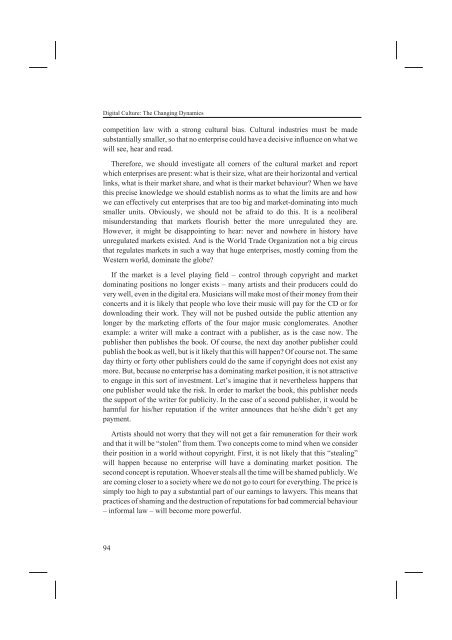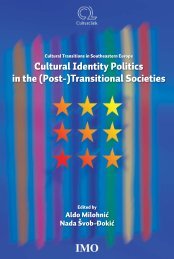D:\Documents and Settings\Ana\My Documents\Biserka-knjiga ...
D:\Documents and Settings\Ana\My Documents\Biserka-knjiga ...
D:\Documents and Settings\Ana\My Documents\Biserka-knjiga ...
You also want an ePaper? Increase the reach of your titles
YUMPU automatically turns print PDFs into web optimized ePapers that Google loves.
Digital Culture: The Changing Dynamics<br />
competition law with a strong cultural bias. Cultural industries must be made<br />
substantially smaller, so that no enterprise could have a decisive influence on what we<br />
will see, hear <strong>and</strong> read.<br />
Therefore, we should investigate all corners of the cultural market <strong>and</strong> report<br />
which enterprises are present: what is their size, what are their horizontal <strong>and</strong> vertical<br />
links, what is their market share, <strong>and</strong> what is their market behaviour? When we have<br />
this precise knowledge we should establish norms as to what the limits are <strong>and</strong> how<br />
we can effectively cut enterprises that are too big <strong>and</strong> market-dominating into much<br />
smaller units. Obviously, we should not be afraid to do this. It is a neoliberal<br />
misunderst<strong>and</strong>ing that markets flourish better the more unregulated they are.<br />
However, it might be disappointing to hear: never <strong>and</strong> nowhere in history have<br />
unregulated markets existed. And is the World Trade Organization not a big circus<br />
that regulates markets in such a way that huge enterprises, mostly coming from the<br />
Western world, dominate the globe?<br />
If the market is a level playing field – control through copyright <strong>and</strong> market<br />
dominating positions no longer exists – many artists <strong>and</strong> their producers could do<br />
very well, even in the digital era. Musicians will make most of their money from their<br />
concerts <strong>and</strong> it is likely that people who love their music will pay for the CD or for<br />
downloading their work. They will not be pushed outside the public attention any<br />
longer by the marketing efforts of the four major music conglomerates. Another<br />
example: a writer will make a contract with a publisher, as is the case now. The<br />
publisher then publishes the book. Of course, the next day another publisher could<br />
publish the book as well, but is it likely that this will happen? Of course not. The same<br />
day thirty or forty other publishers could do the same if copyright does not exist any<br />
more. But, because no enterprise has a dominating market position, it is not attractive<br />
to engage in this sort of investment. Let’s imagine that it nevertheless happens that<br />
one publisher would take the risk. In order to market the book, this publisher needs<br />
the support of the writer for publicity. In the case of a second publisher, it would be<br />
harmful for his/her reputation if the writer announces that he/she didn’t get any<br />
payment.<br />
Artists should not worry that they will not get a fair remuneration for their work<br />
<strong>and</strong> that it will be “stolen” from them. Two concepts come to mind when we consider<br />
their position in a world without copyright. First, it is not likely that this “stealing”<br />
will happen because no enterprise will have a dominating market position. The<br />
second concept is reputation. Whoever steals all the time will be shamed publicly. We<br />
are coming closer to a society where we do not go to court for everything. The price is<br />
simply too high to pay a substantial part of our earnings to lawyers. This means that<br />
practices of shaming <strong>and</strong> the destruction of reputations for bad commercial behaviour<br />
– informal law – will become more powerful.<br />
94



